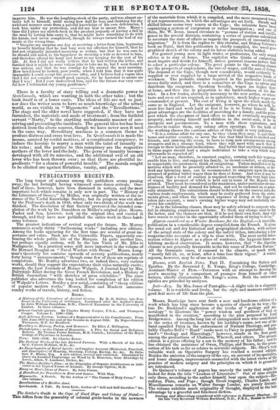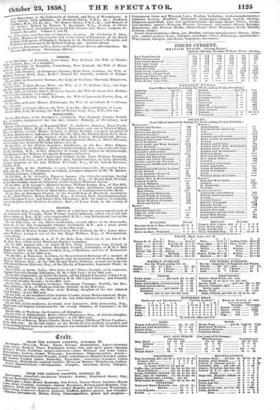PUBLICATIONS RECEIVED.
The long torpor of autumn among the publishers seems passing away, the last fortnight having witnessed some dozen arrivals. One- half of these, however, have been dismissed in notices, and the most important book which remains is only new in part. The " History of the Literature of Greece," by Miller, was originally written at the in- stance of the Useful Knowledge Society, but its progress was cut short by the Professor's death in 1840, when only two-thirds of the work ivas finished. The dissolution of that Society prevented the intended com- pletion of the work by Dr. Donaldson on Miiller's original plan. Messrs. Parker and Son, however, took up the original idea and carried it through, and they have now published the entire work in three hand- some volumes.
The greatest indications of revival regard the future. Mr. Murray announces nearly thirty "forthcoming works" including new editions. Among the books appearing for the first time are several of great im- portance and value. Such are the Cornwallis Papers, apparently em- bracing the whole public life of the Marquis. In quite another line, but perhaps equally curious, will be the late 'Visits of Mr. Ellis to Madagascar. In a practical sense still more important is the volume of Sir Howard Douglas on "Naval Warfare with Steam." Messrs. Long- man's Quarterly list contains upwards of seventy publications, nearly forty being " announcements," though some few of these are reprints or completions. Mr. Bentley advertises two, or indeed three, very curious works, should they support the expectations their titles naturally excite; namely, the Last Journals of Horace Walpole, A Journal kept by Mrs. Dalrymple Elliot during the Great French Revolution, and a History of British Journalism " with sketches of press celebrities." The same publisher also advertises the long looked for completion of his edition of Walpole's Letters. Besides a new serial, consisting of "cheap editions of popular modern works," Messrs. Hurst and Blackett announce sundry works of travels, history, and fiction.
Booms.
A History of the Literature of Ancient Greece. By K. 0. Muller, late Pro- fessor in the University of GOttingen. Continued after the Author's death by John William Donaldson, D.D., Classical Examiner in the University of London. In three volumes.
Athena Cantabrigiensis. By Charles Henry Cooper, F.S.A., and Thompson Cooper. Volume I. 1500-1585.
Audi Alteram Portent. Letters of a Representative to his Constituents. From 15th June 1857 to the end of the Session in August 1858. By Major-General Thompson, M.P. for Bradford.
Heraldry in History, Poetry, and Romance. By Ellen J. Millington. Philadelphia; or the Claims of Humanity. A Plea for Social and Religious Reform. By Thomas Foster Barham, M.B. Cantab., Licentiate of the Royal College of Physicians in London.
Terse. 1834-1858. By Charles Boner.
The Poetical Works of the late Richard Furness. With a Sketch of his Life, by G. Calvert Holland, M.D., 8m.
AnEneyclopcedia of Rural Sports; or Complete Account (Historical, Practical, and Descriptive) of Hunting, Shooting, Fishing, Racing, &c. 80. By Dela, bere P. Blaine, Esq. A new edition, revised and corrected. Illustrated by above six hundred Engravings on Wood by R. Branston, from Drawings by Leech, Aiken, T. Landseer, Dickes, 80. The Master-Builder's Plan; or the Principles of Organic Architecture as indi- cated in the Typical Forms of Animals. By George Ogilvie, M.D. Buoy on Man's Ideas of Power. By John Faram.
A Handbook for Travellers in Sent and Sussex. With Map, Mignonette. A Sketch. By the Author of " The Curate of Holy Cross." In two volumes.
Beeolleylions of a Maiden Aunt.
Quicksands. A Tale. By Anna Lisle, Author of " Self and Self-Sacrifice." Sic.
2%e Settler's Guide to the Cape of Good Hope and Colony of Natal.— This differs from the generality of colonial guide-books in the newness
of the materials from which it is compiled, and the more measured tone, if not representation, in which the advantages are set forth. Steady skilled labour seems very scarce at the Cape the colonists have and t organizing a system of emigration or rather immigration; and one of and Bishop Colense'a them, Mr. W. Irons, issued circulars to " persons of station and intern. gence in the several districts, containing a series of questions calculated to ascertain the state of affairs as regards the prospects of successful ian. migration." It is from the replies to this circular, book on Natal, that this publication is chiefly compiled, the usual geo- graphical sketch of the colony and its latest statistics being added. For genteel young men in light trades or professions, the only sound advice is to stay at home. The capitalist who think0 of emigrating must inquire and decide for himself, unless personal reasons induce him to select a particular colony. The great points to the working dame, are the prospects of employment, the rate of wages, and the cost of living. The demand at the Cape though now considerable, would evidently f>0 supplied or over supplied by a large arrival of the respective kinds of workmen. The probable number required in the particular localities seems fairly stated, and there is a committee at the Cape to advise and distribute the emigrants. Speaking broadly, wages are higher than at home, and they rise in proportion to the backwardness of the dia. trict. In a few trades, absolutely necessary to the new settler, or where taste and even art are required, as in upholstery, much higher wages are commanded at present. The cost of living is upon the whole much the same as in England. Let the emigrant, however, go where he will, he must live hard and work hard at first if he is to better himself. Ea great advantages are the facilities of providing for a family, and the pros- pect which the cheapness of land oflbrs to him of eventually acquiring property, and raising himself and children in the social scale, if he is energetic and parsimonious. To a man with these aspirations, and faculties to realize them, any colony offers openings. To the bulk of the working classes the cautious advice of this Guide is very judicious.
"It is a serious affair for any one, be they whom they may, to quit their home and native country, to sever the ties that bind them to kindred and friends, and crossing the ocean, to have to form new arrangements among strangers and in a strange land, where they will meet with much that is foreign to their habits and inclinations. Goal forbid that anything contained in these pages should lead a single individual to take a step which may afterwards be repented of!
" Let no man, therefore, in constant employ, earning such fair wages as enable him to live, and support his family, in decent comfort, or otherwise in respectable circumstances, think of emigrating. Unless impelled to it by motives which will be presently alluded to, no mechanic or artisan, or in- deed any labouring man, can be recommended to emigrate upon the mere prospect of getting better wages than he does at home. And here it may be observed, that a word of caution is required respecting the very high rates of wages, the prospect of which is held out in some of the Reports here printed. They must be considered as the maximum, under particular circum- stances of locality and demand for labour, and not be reckoned on as gene- rally attainable. The calculations should be formed on the current rates for various trade employments, which may be easily gathered from the state- ments given; and when the increased expenses of living at the Cape are into nto account, a man's earning higher wages may not materially im-
prove his condition. * "As to the labouring classes, those may be safely advised to emigrate who fail in obtaining employment at home. To them any change must be for the better, and the chances are that, if it be not their own fault, they will have reason to rejoice in the opportunity afforded them of trying to do so."
Algeria considered as a Winter .Residence for the English.—A tract-like publication in a considerable degree compiled from the French. It gives the usual cut and dry historical and geographical sketches, with notices of the actual state of the colony and the native tribes, introducing a few magazine-like accounts of a trip to close with. The most useful infor- mation relates to Algiers as a place of residence, the hygienic hints ex- hibiting medical observation. It seems, however, that the Algerian climate is not generally favourable to the fair races of Northern Europe.' All the Germanic races, if exposed to the climate, or much work, "mostly fall ill, or, at least, after a time lose their vigour." A winter sojourn, however, may be of use to invalids.
Horace, with English Notes. Part II. Containing the Satires and Epistles. By the Reverend J. E. Yonge, King's College, Cambridge; Assistant-Master at Eton.—Terseness with an attempt to develop the poet's meaning by a comparison of passages from himself or other writers, chiefly characterizes Mr. Yonge's notes. Both the satires and epistles are preceded by analyses.
Loll—Er y. By Mrs. Jones of Pant-glas.—A alight tale in a sixpenny volume. It is readable and lively, but the style and manners exhibit a good deal more of life than the plot.
Messrs. Routledge have sent forth a new and handsome edition of a work which has long since become a species of classic in its way; the late Dr. Buckland's application of the truths of " geology and raj' aerology" to illustrate the " power wisdom and goodness of God sx manifested in the creation," according to the plan proposed by Lord Bridgewater. Among the long list of distinguished men who contributed to the series of treatises, known by his lordship's name, not one of the band equalled Paley in the enforcement of Natural Theology, and pro- bably Charles Bell's " Hand" ranks next to Paley in popularity, Buck- land's " Geology and Mineralogy," however, stands in the first grade among the productions of Chalmers, Whewell, and others. The present edition is a pious offering by a son to the memory of his father; and he has obtained the assistance of Owen, Phillips, and-Brown, in the prose- cution of his task so far as relates to scientific subjects. Mr. Skey's Very valuable work on Operative Surgery has reached a second edition. Besides the omission of the surgery of the eye, on account of its speciality, and lesser changes, improvements connected with the latest views of tJa.e practice of modern surgery and the principles on which it is grounded are introduced. De Qnincey's volume of papers has scarcely the unity that might be looked for from the title "Leaders of Literature." Out of nine articles only three, according to the author himself, bear upon the subject—Re; rodotus, Plato, and Pope ; though Greek tragedy, Charles Lamb, sun Miscellaneous remarks on Walter Savage Lander, are purely literary' volume exhibits much originality of thought,. displayed to the De* advantage by a graceful and felicitous diction. Geology and Mineralogy considered with reference to Natural The?logY. uIthe late Very Reverend William Buckland, D.D., F.R.S., Reader in Gee ve; and Mineralogy. in the .II.niversity of Oxford, and Dean of Westminster. A new edition, with Additions, by Professor Owen, F.R.S., &c. ; Professor phalips, MA., LL.D., Ike.; Mr. Robert Brown, F.R.S., &c., and Memoir of the Author. Edited by Francis T. Buckland, MA., Student of Christ Church, Oxford, Assistant-Surgeon 2d Life Guards, late House Surgeon. St. George's Hospital. Volume I. and II. The Principles and Practice of Operative Surgery. By Frederick C. Skey, p.m., Member of the Council and of the Court of Examiners of the Royal College of Surgeons of England, Surgeon to St. Bartholomew's Hospital, and professor of Anatomy to its Medical College, &c. Second edition. Leaders in Literature with a Notice of Traditional Errors affecting them. By Thomas De Quincey. Stereotype edition.



























 Previous page
Previous page